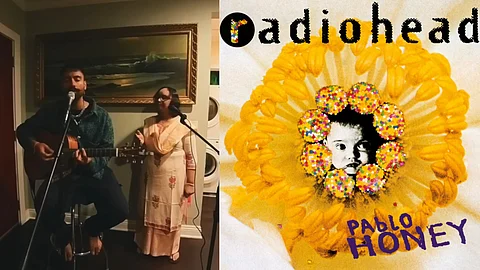
- HOMEGROWN WORLD
- #HGCREATORS
- #HGEXPLORE
- #HGVOICES
- #HGSHOP
- CAREERS
- ABOUT US
- CONTACT US

Music has this uncanny ability to transcend boundaries. It doesn’t matter where you’re from, what language you speak, or even what generation you belong to — somehow, the right song cuts through these divides stitching us all together. It’s this universal power that makes the internet lose its collective mind when something magical happens, like a mother-son duet blending Radiohead’s iconic Creep with the ancient strains of Hindustani classical music. The viral video in question is as heartwarming as it is mind-blowing. Featuring Avie Sheck, an LA-based artist and his mum, this cover is a fusion that bridges generations, geographies, and genres. The son’s raw, angsty vocals embody a modern alienation, a hallmark of Creep, while the mother’s soulful classical rendition supplies a tender care and emotion, almost as if she’s comforting him through the music.
What makes this performance so moving isn’t just the technical brilliance but the story it tells. Let's talk about the mom first. She's singing in Brajbhasha, a poetic predecessor to modern Hindi. Known for its metaphor-laden simplicity, Brajbasha has deep roots in medieval devotional music. Many compositions in this language revolve around Krishna, a god known for his mischief, rule-breaking subversiveness, and playful, boundless love. In this song, Krishna's mother is asking her son, the shepherd, who is still asleep to wake up. Other shepherds have gone out to the fields and they are asking her about Krishna's whereabouts.
When you compare it to Creep, everything clicks. Radiohead's most loved track, Creep’s raw, confessional lyrics, '...I don’t belong here', have become a universal anthem for misfits, but they hit differently when seen through a South Asian lens. In many desi households, children often feel the weight of expectations that clash with their personal dreams and identities. The struggle to be 'enough' in the eyes of one’s parents can feel isolating, like you’re a stranger in your own family. So the mother's call to wake up Krishna is actually a call for connection. The duet then, becomes a dialogue between a mother and her son, between despair and hope; between alienation and belonging.
This cross-cultural mash up is also a symbol of most Indian parent-child relationships. It's the lyrical version of "come have dinner with us" vs "I'm going to eat in my room". Only here there is no push and pull between the two; no right or wrong. In fact, the two worlds harmonize perfectly together, hinting to some subliminal truth of the beauty of duality.
It’s also a cultural conversation about how different generations communicate with each other through art. The son brings the rawness of Radiohead, a band synonymous with Gen X and millennial angst, while the mother draws from centuries-old traditions that speak of devotion, healing, and transcendence. Together, they create a piece of music that’s not just beautiful but deeply symbolic. It’s a reminder of the bridges music can build — between East and West; past and present; self and other.
Follow Avie Sheck here and listen to the cover below.
